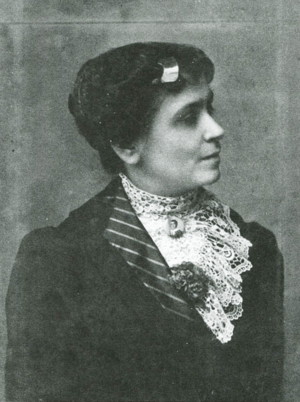Maria Veleda facts for kids
Maria Veleda (born Maria Carolina Frederico Crispin, 1871–1955) was an important Portuguese teacher, journalist, and activist. She was one of the first and most effective feminists in Portugal. Maria fought for better rights for women working in factories. She also strongly believed that women should get a good education.
In 1907, she started the Portuguese Group of Feminist Studies. A year later, in 1908, she helped create the Republican League of Portuguese Women. She even became the president of its board. Later, in 1915, she formed the Female Association of Democratic Propaganda to encourage women to get involved in politics.
Contents
Her Life and Work
Maria Carolina Frederico Crispin was born on February 26, 1871, in Faro, Portugal. Her father, João Diogo Frederico Crispim, was a property owner.
In the early 1900s, Maria worked as a journalist in southern Portugal. She wrote poems, stories for children, and a small book called Emancipação Feminina (Women's Emancipation). This book was about women gaining more freedom and rights.
Teaching and Women's Rights
By 1908, Maria was teaching at the Afonso Costa School Centre in Lisbon. She started evening classes and gave talks to help women join professional jobs or get involved in politics. She strongly pushed for women to have the right to vote. She also wanted women to have more training and education. Maria believed women should have shorter working hours and be able to work in any job.
She became a member of the Republican League of Portuguese Women (RLPW). The next year, thanks to her idea, the RLPW started "Obra Maternal." This project helped care for and educate children who were poor or had no one to look after them. In 1912, Maria was chosen to be a delegate for Lisbon's Childhood Surveillance Centre. She kept this important job until 1941.
International and Political Efforts
In June 1913, Maria Veleda traveled to Budapest. She was part of the Portuguese group at the Seventh Conference of the International Woman Suffrage Alliance. This was a big meeting where people from different countries discussed women's right to vote. Other important women with her included Ana Augusta de Castilho and Beatriz Pinheiro.
In 1915, Maria founded the Women's Democratic Propaganda Association. This group aimed to help women think freely and fight against unfairness and war.
Later Years
After 1921, Maria Veleda became unhappy with the violence in the new republican government. She decided to leave politics. Instead, she became interested in spiritualism, which is a belief system focused on spirits and the afterlife. She started the Spiritualist Group Light and Love. In 1925, she organized the Portuguese Spiritual Congress. She also wrote articles for spiritualist newspapers.
Maria Veleda passed away in Lisbon on April 8, 1955.
See also
- Maria Veleda para niños (in Spanish)
 | Aurelia Browder |
 | Nannie Helen Burroughs |
 | Michelle Alexander |


